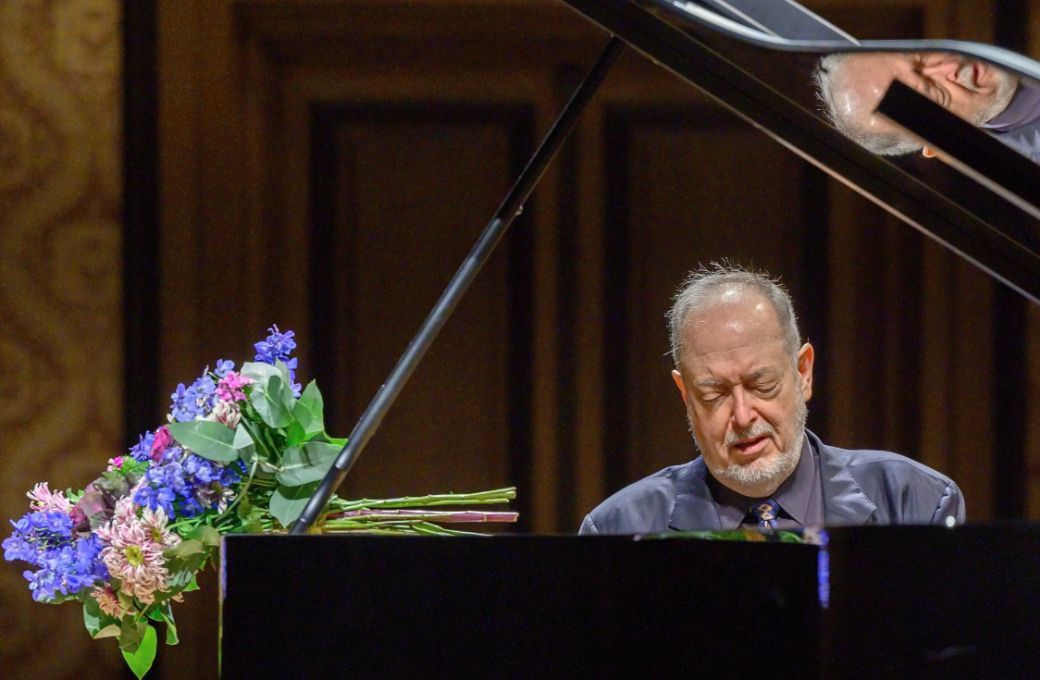After all these years, Garrick Ohlsson still looks a little dazzled when he walks onto the stage at the Rudolfinum, as if taking in the intimate grandeur of Dvořák Hall for the first time. A beloved figure in Prague ever since his heroic performance at Prague Spring in 1974, Ohlsson dazzled a receptive audience in his latest visit with a recital that in some ways was like a career retrospective.
Beethoven has been a mainstay of his repertoire, including a nine-volume recording of the composer’s piano sonatas that won a Grammy Award. Ohlsson opened this performance with the Sonata no. 6 in F major, immediately showing his signature style – crisp, unhurried, attuned to every nuance in the music. It sounded both familiar and fresh, rendered with a crystalline clarity. Even in the animated exuberance of the final movement, every note was clear.
Ohlsson has also recorded the music of Ursula Mamlok, a versatile 20th-century composer whose 2000 Notes poses nearly insurmountable technical challenges. A five-movement series of shocks, jolts, abrupt runs and sudden outbursts, it demands a virtuoso touch, hammering the keys one moment and barely brushing them the next. Using the percussive elements as an anchor, Ohlsson gave the fractured work classical integrity. He inadvertently showed how difficult it is in the final movement, which is so outrageously complex that he had to take a mulligan, starting it over when his first attempt fell apart after a few bars.
Clearly unhappy with the faux pas, Ohlsson dove for relief into Schubert’s sprawling Wanderer Fantasy. The melodies flowed like water, chords rang out with authority, and the blazing runs of the third movement sparkled with sheer joy. Ohlsson also showed himself to be a master of the work’s many moods and atmospheres, crafting light, airy lines, building up dramatic crescendos, sweeping the audience along on high-spirited excursions. And the finale was gripping, a fasten-your-seat-belt ride of captivating virtuosity that blazed to a majestic ending. The Wanderer poses its own technical challenges, but after the atonal intricacies of 2000 Notes, there was a refreshing sense of freedom, of Ohlsson being turned loose to indulge in the pure pleasure of unencumbered playing.
A second half devoted entirely to Chopin took Ohlsson back to the event that launched his career worldwide, his first-place finish at the International Chopin Piano Competition in Warsaw in 1970. For this reprise he chose four pieces: Impromptu No. 2, Variations Brillantes, Fantaisie in F minor and Ballade No. 1. The through line in the program was the unique voice that Ohlsson brings to Chopin, a technical brilliance with a subtle emotional underpinning that gives the music an inner glow, a tug on the heartstrings amid the flurries of notes.

This quality was front and center in the Impromptu, which sounded warm and inviting. The Variations were commanding and true to the title, bright and colorful, with just a hint of the audacity in the original eponymous style. The Fantasie sagged a bit at times despite an up-tempo treatment, as Ohlsson lingered over some of the darker, solemn tones. He went the other way in the Ballade, starting with soft caresses and then expanding the piece to grand dimensions, finding more character and variety than one typically hears in Chopin.
For all his interpretive gifts, Ohlsson ultimately lets the music speak for itself, putting an elegant frame around it, adding a stylish touch – and then getting out of the way. At every point in his storied career, it’s been a winning approach.


